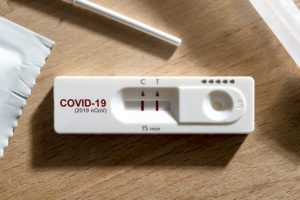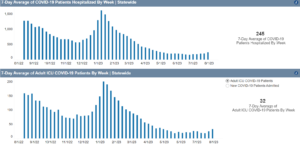Covid-19 has spiked every summer since 2020 — and this year’s no exception.

Cases and hospitalizations have risen since mid-July, according to the CDC.
Per the CDC, last month the U.S. saw its first bump in hospitalizations since the U.S. ended its Covid-19 public health emergency in May. From July 9 to 15, the number of patients admitted with the virus rose 10.3 percent; the following week, it was up 12 percent.
The number of positive cases has become harder to determine now that the CDC has stopped releasing its detailed reports, but one way to measure the spread is through wastewater analysis. According to recent tests, more Americans are being infected, with the highest increases in the Northeast and South. Walgreens, the pharmacy chain, has also reported that 42 percent of its tests were positive in the last week of July, compared to 29 percent in late June.
North Carolina hospitalizations for Covid-19 show a slight increase, but are no where close to last summers rates.

Why are Covid cases rising this summer?
As in previous years, it’s partly because the heat has forced more people to flock indoors and into the AC. The virus is more likely to get transmitted with more people mingling and breathing the same recirculated air. The rise in summer travel is also likely a factor, experts say.
Plus, for many of us, our immunity has begun to wane. Only 17 percent of Americans have received the bivalent vaccines, which were rolled out last fall and are supposed to protect against Omicron variants, Wired reports. Another reason for the uptick may be all the wildfire smoke this summer. There’s evidence that pollution may weaken the immune system — and in 2020, when California and the Pacific Northwest were subject to one particularly hellish season of smoggy air, the states saw an elevated level of Covid-19 fatalities, one study found.
Positive rates are “still near historic lows after 7 months of steady declines,” CDC spokesperson Kathleen Conley said last week. The number of fatalities has also reached an all-time low, The New York Times reports.
Leana Wen, M.D., a physician and professor of health policy and management at George Washington University, tells CNN that those who are generally healthy and have either been vaccinated or have been infected are not likely to become severely ill, but they still run the risk of developing long Covid. (It’s estimated that one in 10 Covid survivors end up with the condition.) Older adults and those with weakened immune systems are still vulnerable and Dr. Wen says they should avoid large indoor crowds, consider masking, and make sure they’re up-to-date on their boosters.
